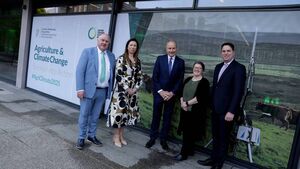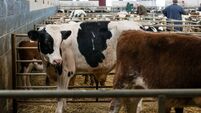Agri-climate conference discusses latest research to support farming

Pictured, from left: Minister of State with responsibility for Food Promotion, New Markets, Research and Development, Noel Grealish TD; Bridget Lynch, Senior Research Officer, Teagasc; Taoiseach Micheál Martin; Suzanne Rowe, Principal Scientist, AgResearch New Zealand; Minister for Agriculture, Food and the Marine Martin Heydon TD, attending the ‘Agriculture and Climate Change: Science into Action’ conference at Dublin Castle. Photo: Maxwells
The ‘Agriculture and Climate Change: Science into Action’ conference, held at Dublin Castle last week, was dedicated to addressing the intricate relationship between agriculture and climate change.
The 500 delegates in attendance heard from national and international scientists on the latest research to reduce agricultural emissions and enhance carbon storage on farms across the country.
The conference took place alongside a meeting of the Global Research Alliance for Agricultural Greenhouse Gases, which Ireland, through the Department, is currently chairing.
In his opening address, Taoiseach Michael Martin said: “The transition to climate-smart agriculture does not need to be a burden. It is a chance to safeguard what matters most — our land, our water, our food, our planet and our future. It is a chance to show that climate action and agricultural excellence can go hand in hand — and that Irish farmers can lead the way.”
Minister for Agriculture, Martin Heydon, added: “Reducing emissions from agriculture is a monumental challenge, but one that the sector is taking seriously... Research funding from my Department has supported world-leading agri-climate research in universities, Teagasc and other institutes across the country.
"In 2023 and 2024, this funding created 132 new research positions in agriculture and climate research across 28 projects. This ensures we have some of the best research talent in the world working on these complex scientific areas.”
During the conference, delegates heard about research progress on the following areas:
- Animal breeding to reduce methane
- Feed additives to reduce methane
- Biostimulants to reduce chemical nitrogen fertiliser requirements
- Fertiliser formulation to reduce emissions






